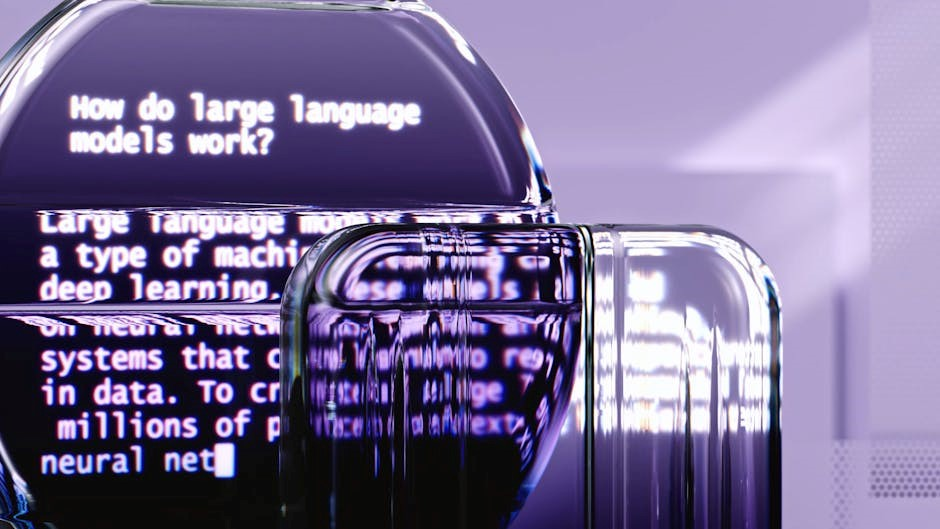generative ai with langchain pdf
Generative AI‚ powered by large language models (LLMs)‚ is revolutionizing how we interact with technology. LangChain‚ a modular framework‚ simplifies building AI applications‚ enabling developers to create production-ready solutions efficiently. This book provides a comprehensive guide to leveraging LangChain for developing innovative applications‚ including agents and personal assistants‚ while addressing ethical considerations and enterprise deployment strategies.
Overview of Generative AI
Generative AI represents a transformative leap in artificial intelligence‚ enabling machines to create content‚ from text and images to code. By leveraging advanced large language models (LLMs)‚ it generates human-like outputs‚ revolutionizing industries such as content creation‚ customer service‚ and data analysis. The 2024 edition of Generative AI with LangChain provides a comprehensive guide‚ featuring updated code examples and a free PDF‚ perfect for developers and researchers seeking to harness AI’s potential effectively.
What is LangChain?
LangChain is a modular framework designed to simplify the development of applications powered by generative AI. It supports both Python and JavaScript‚ enabling developers to build and integrate large language models (LLMs) seamlessly. By providing a flexible and extensible architecture‚ LangChain empowers creators to craft innovative solutions‚ from chatbots to advanced AI agents‚ while addressing the inherent limitations of LLMs through modularity and customization.
Importance of LangChain in Generative AI Development
LangChain plays a pivotal role in advancing generative AI by providing a modular framework that streamlines application development. Its ability to integrate with various LLMs and tools enables developers to overcome inherent limitations of large language models. By fostering scalability‚ customization‚ and collaboration‚ LangChain accelerates the creation of production-ready AI solutions‚ making it indispensable for enterprises and innovators alike in harnessing the full potential of generative AI technologies effectively.

Generative AI with LangChain: Book Overview
The 2024 edition offers updated code examples and an improved GitHub repository‚ providing practical insights into building production-ready applications with LLMs. Includes a free PDF eBook.
Written by experts like Ben Auffarth and Leonid Kuligin‚ this guide focuses on leveraging LangChain for creating innovative AI solutions‚ making it a must-have resource for developers.
Key Features of the 2024 Edition
The 2024 edition of Generative AI with LangChain includes updated code examples‚ an enhanced GitHub repository‚ and a free PDF eBook. It focuses on overcoming inherent LLM weaknesses‚ exploring ethical dimensions‚ and addressing application challenges. The book also delves into building production-ready applications‚ creating agents‚ and leveraging LangChain for enterprise solutions. With insights from experts like Leonid Kuligin‚ it provides a comprehensive guide for developers and researchers aiming to harness generative AI effectively.
Target Audience for the Book
This book is designed for developers‚ researchers‚ and anyone interested in LangChain and generative AI. It caters to both technical and non-technical readers‚ offering practical insights for building AI applications. Whether you’re a seasoned developer or just exploring the field‚ the book provides actionable guidance. It’s particularly useful for enterprise professionals‚ data scientists‚ and enthusiasts looking to understand and implement generative AI solutions effectively.
Authors and Their Expertise
Authors Ben Auffarth and Leonid Kuligin bring extensive experience in AI and software development. Ben has expertise in data analysis and AI applications‚ while Leonid‚ a Google Cloud AI engineer‚ specializes in LangChain integrations. Their combined knowledge ensures a comprehensive guide‚ blending practical examples with technical insights‚ making the book a valuable resource for developers and researchers alike.
Understanding the LangChain Framework
LangChain is a modular framework designed to simplify the development of generative AI applications. It provides tools and structures to build efficient‚ scalable‚ and maintainable AI-powered solutions.
Architecture and Components
The LangChain framework features a modular architecture designed to streamline generative AI application development. It consists of components like language models‚ memory modules‚ and execution environments. These elements work together to enable efficient processing of inputs‚ management of context‚ and execution of complex tasks. The framework’s flexibility allows developers to integrate various LLMs and customize workflows‚ making it a powerful tool for building sophisticated AI-driven solutions.
Modular Approach to Application Development
LangChain’s modular design enables developers to create flexible and scalable applications by breaking down complex tasks into manageable components. This approach supports seamless integration of various LLMs‚ memory systems‚ and execution environments‚ allowing for tailored solutions. By leveraging predefined modules‚ developers can focus on innovation rather than rebuilding foundational elements‚ accelerating the development of advanced generative AI applications.

Building Applications with Generative AI
Generative AI with LangChain enables developers to create production-ready applications‚ including intelligent agents and personal assistants. This approach streamlines development‚ allowing for innovative and scalable solutions in AI.
Developing Production-Ready Applications
Generative AI with LangChain equips developers to build robust‚ production-ready applications. The 2024 edition provides updated code examples and an improved GitHub repository‚ ensuring scalability and reliability. By leveraging LangChain‚ developers can overcome inherent weaknesses of large language models (LLMs) and create efficient‚ enterprise-grade solutions. Practical implementations include advanced agents and personal assistants‚ showcasing the framework’s versatility. The book’s focus on ethical considerations and real-world applications ensures developers can deploy AI responsibly and effectively in various industries.
Creating Agents and Personal Assistants
LangChain simplifies the creation of intelligent agents and personal assistants‚ enabling developers to design tailored solutions. The 2024 edition offers enhanced code examples‚ empowering users to build sophisticated AI-driven tools. By integrating large language models (LLMs) with LangChain‚ developers can craft agents that perform complex tasks‚ from data analysis to decision-making. These tools enhance productivity‚ offering personalized support across industries. The framework’s modular design ensures flexibility‚ making it easier to adapt agents to specific user needs and workflows effectively.
Working with Large Language Models (LLMs)
Large Language Models (LLMs) are powerful tools for generating text and solving complex tasks. LangChain enhances their capabilities‚ enabling developers to build robust applications by addressing these weaknesses effectively.
Strengths and Limitations of LLMs
Large Language Models (LLMs) excel at generating coherent text‚ solving complex problems‚ and processing vast datasets. However‚ they face limitations such as hallucinations‚ lack of common sense‚ and ethical concerns. While LLMs are powerful‚ they often struggle with contextual understanding and real-world applicability‚ requiring frameworks like LangChain to enhance their practical use and mitigate inherent weaknesses‚ ensuring more reliable and ethical outcomes in generative AI applications.
Enhancing LLM Capabilities with LangChain
LangChain enhances LLM capabilities by enabling model chaining‚ combining AI with external data‚ and leveraging memory modules for context retention. It allows developers to build sophisticated applications like agents and personal assistants‚ ensuring coherent and context-aware interactions. By bridging LLMs with practical implementations‚ LangChain addresses their limitations‚ making them more reliable and scalable for enterprise use. The 2024 edition provides updated code examples and resources to help developers maximize LLM potential effectively.

Ethical Considerations and Challenges
Generative AI with LangChain raises ethical concerns like data privacy‚ bias‚ and misinformation. Addressing these challenges ensures responsible AI development and deployment with enhanced transparency and user trust.
Ethical Dimensions of Generative AI
Generative AI introduces complex ethical issues‚ including data privacy‚ algorithmic bias‚ and potential misuse. The LangChain framework emphasizes responsible AI development‚ ensuring transparency and accountability. Addressing these dimensions is crucial for maintaining trust and preventing harm. Ethical considerations guide developers in creating applications that align with societal values and minimize risks. By prioritizing ethical practices‚ generative AI can be a transformative force for good.
Addressing Application Challenges
Developing production-ready generative AI applications presents challenges like model reliability‚ scalability‚ and integration. LangChain offers tools to mitigate these issues by providing modular components and best practices. The framework helps optimize performance‚ ensure consistency‚ and streamline deployment across enterprise environments. By addressing these challenges‚ developers can build robust‚ scalable applications that deliver value while maintaining user trust. Effective solutions require careful planning and leveraging LangChain’s capabilities to overcome technical and operational hurdles.

Enterprise Deployment of Generative AI
Enterprise deployment of generative AI requires robust solutions. LangChain enables scalable integration‚ with experts like Leonid Kuligin advancing Google Cloud implementations‚ ensuring seamless enterprise adoption and efficiency.
Enterprise-Ready Solutions
Enterprise-ready solutions with LangChain streamline generative AI integration. The framework supports scalable applications‚ ensuring reliability and security. Leonid Kuligin‚ a Google Cloud expert‚ emphasizes its role in enterprise deployment‚ highlighting efficient tools for large language model apps. This approach allows businesses to leverage AI effectively‚ driving innovation and operational efficiency across industries.
Google Cloud Integrations
LangChain seamlessly integrates with Google Cloud‚ enabling robust generative AI solutions. Leonid Kuligin‚ a Google Cloud AI engineer‚ highlights the framework’s role in streamlining enterprise deployments. The 2024 edition provides updated code examples‚ ensuring compatibility with Google’s AI tools. This integration allows developers to leverage Google Cloud’s scalable infrastructure‚ enhancing the development of production-ready applications and fostering innovation in generative AI technologies.
Real-World Applications and Examples
Generative AI with LangChain enables practical applications like personal assistants‚ content generation‚ and data analysis. The book provides examples of production-ready solutions‚ showcasing LangChain’s scalability and efficiency.
Case Studies and Success Stories
The book highlights real-world applications of Generative AI with LangChain‚ featuring case studies like Google Cloud’s integration for demand forecasting and a system optimizing query times from 30 minutes to seconds. These examples demonstrate LangChain’s ability to streamline development and enhance efficiency‚ proving its value in enterprise environments. Success stories emphasize how developers leverage LangChain to build scalable‚ production-ready solutions‚ showcasing its transformative potential across industries.
Practical Implementations of LangChain
LangChain is widely used in building applications like chatbots‚ document analysis tools‚ and workflow automations. For instance‚ it simplifies integrating LLMs into existing systems‚ enabling developers to create efficient AI-driven solutions. The framework’s modular design allows for flexible implementation‚ making it ideal for both small-scale projects and enterprise-level deployments. By leveraging LangChain‚ developers can quickly prototype and deploy applications‚ accelerating the adoption of Generative AI technologies across various industries.
Future Trends in Generative AI
Generative AI will see advancements in LLM integration‚ enterprise adoption‚ and ethical frameworks. LangChain will play a key role in shaping these innovations‚ enabling scalable and efficient AI solutions.
Emerging Technologies and Innovations
Generative AI is rapidly evolving‚ with advancements in large language models (LLMs) and frameworks like LangChain. Innovations in LangChain’s modular architecture are enabling developers to build scalable‚ production-ready applications. The integration of LangChain with tools like ChatGPT and Gemini is driving the creation of sophisticated AI agents and personal assistants. These technologies are paving the way for transformative enterprise solutions‚ ethical AI implementations‚ and enhanced human-AI collaboration‚ positioning LangChain as a cornerstone of future generative AI development.
Role of LangChain in Future Developments
LangChain is poised to play a pivotal role in shaping the future of generative AI by enabling scalable‚ modular‚ and enterprise-ready applications. Its framework simplifies the integration of large language models (LLMs) like ChatGPT and Gemini‚ fostering innovation in AI development. With a strong focus on ethical considerations and practical implementations‚ LangChain will continue to empower developers and researchers‚ driving advancements in AI capabilities and ensuring its adoption across diverse industries. Its role in future developments underscores its importance as a foundational tool for generative AI.

Community and Support
The LangChain community is active and growing‚ with strong support from experts like Leonid Kuligin‚ who contributes to its development and education. Regular updates and resources ensure accessibility and innovation for all users.
LangChain Community and Resources
The LangChain community is vibrant‚ with active contributors like Leonid Kuligin‚ a Google Cloud AI engineer‚ who supports its growth. The framework offers extensive resources‚ including updated code examples and a improved GitHub repository. Additionally‚ the book provides a free PDF eBook‚ ensuring accessibility. Regular updates and documentation help developers stay informed. The community’s collaborative environment fosters innovation‚ making it easier for users to learn and implement LangChain effectively.
Contributions and Maintenance
LangChain benefits from active contributions‚ with experts like Leonid Kuligin‚ a Google Cloud AI engineer‚ maintaining key integrations. Regular updates ensure the framework stays current‚ with improved code examples and a robust GitHub repository. The community’s collaborative efforts focus on stability and innovation‚ making LangChain a reliable tool for developers. This commitment to maintenance ensures users have access to cutting-edge solutions‚ fostering continuous growth in the generative AI space.

Getting Started with Generative AI and LangChain
Begin by setting up your development environment and exploring the book’s resources. The 2024 edition includes updated code examples and a free PDF eBook for ease of learning.
Setting Up the Development Environment
To start with Generative AI and LangChain‚ install Python and the LangChain library. Clone the GitHub repository from the book to access updated code examples and resources. Ensure you have the latest versions of the required dependencies. The free PDF eBook included with the book purchase serves as a handy reference. Follow the setup guide to configure your environment and begin exploring the practical implementations of LangChain for building innovative applications.
Learning Resources and Documentation
The book provides a free PDF eBook‚ ensuring easy access to its comprehensive guide. The accompanying GitHub repository offers updated code examples and practical implementations. Authors Ben Auffarth and Leonid Kuligin share their expertise through detailed explanations and real-world applications. Additional resources include live events‚ curated courses‚ and community support‚ making it easier for developers and researchers to master LangChain and generative AI. These resources collectively empower learners to stay updated and proficient in the evolving field of AI development.
This book equips you with the knowledge to harness generative AI and LangChain. Experiment with the provided code‚ explore ethical implications‚ and stay updated on emerging technologies to lead in this transformative field.
Recap of Key Concepts
Generative AI with LangChain simplifies developing production-ready applications using large language models. The 2024 edition offers updated code examples‚ a refined GitHub repository‚ and a free PDF eBook. It caters to developers‚ researchers‚ and enthusiasts‚ providing insights into LLMs‚ ethical considerations‚ and enterprise deployment. Authors Ben Auffarth and Leonid Kuligin bring expertise in AI engineering and LangChain integrations‚ ensuring practical guidance for building agents and real-world applications.
Guidance for Further Exploration
To deepen your understanding‚ explore the LangChain community and resources‚ including GitHub repositories and live events. Leverage the free PDF eBook for hands-on learning. Stay updated with emerging technologies and innovations in generative AI. Engage with practical implementations and real-world applications to refine your skills. Consider enrolling in curated courses and participating in community discussions for continuous growth in this dynamic field.
- Join the LangChain community for collaborative learning.
- Access updated code examples and enterprise-ready solutions.